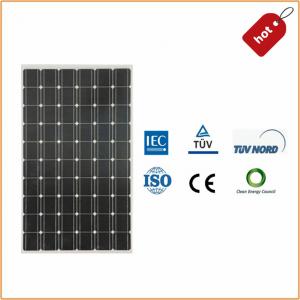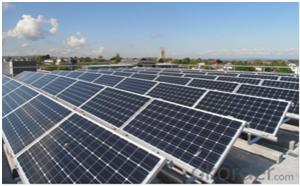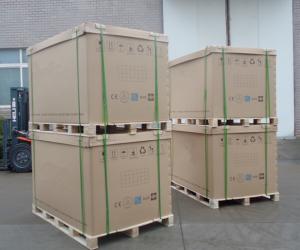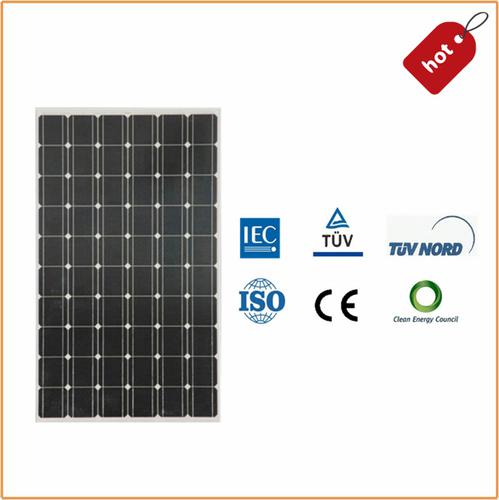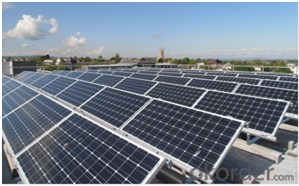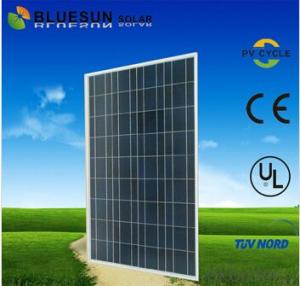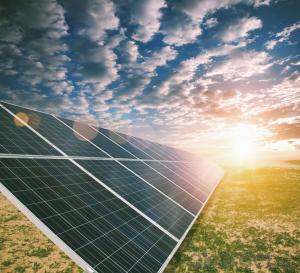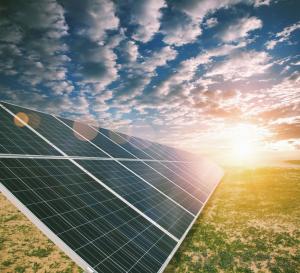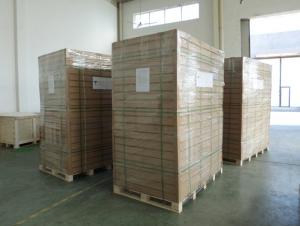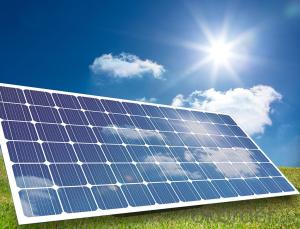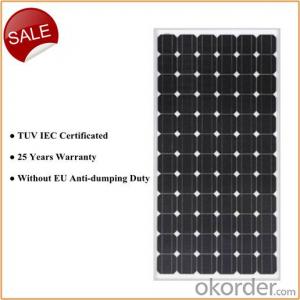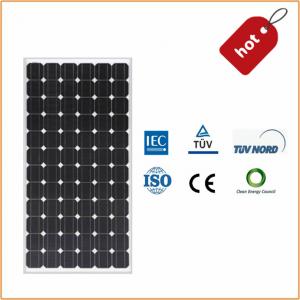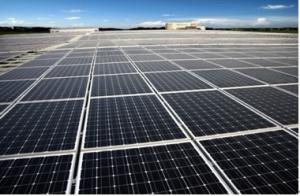Manchester Solar Panels - Outdoor Mono 260W PV Solar Module with Certification TUV
- Loading Port:
- Ningbo
- Payment Terms:
- TT or LC
- Min Order Qty:
- -
- Supply Capability:
- 600MW watt/month
OKorder Service Pledge
OKorder Financial Service
You Might Also Like
260w Solar Module TUV Solar Module 260w, Mono Solar Panel 250w
Competitive solar panel 260w with good quality
The solar panels 260w certificated with TUV,IEC,CEC,CE and so on.
TUV Solar Module 260w Mechanical Characteristics
Cell Type | Mono Crystalline 125×125mm( 5inch) |
No. of Cells | 96(8×12) |
Dimension | 1580×1056×45mm |
Weight | 20kg |
TUV Solar Module 250w Component Element
Front Glass | 3.2mm, High Transmission, Low Iron, Tempered Glass |
Frame | Anodized Aluminum Alloy Type 6063-T5 |
Junction Box | IP 65 Rated (Black) |
Output Cables | TUV 1×4mm2, length:900mm |
Connector | MC4(UV resistance and self-locking/IP67) |
Encapsulation Material | EVA(0.50±0.03mm thickness) |
Back Foil | White TPT(0.32±0.03mm thickness) |
Fixing Adhesive | Silicone Sealant(White) |
TUV Solar Module 250w Specifications
Module Type | 60M | ||||||
Maximum Power at STC (Pmax) | 260Wp | ||||||
Maximum Power Voltage (Vmp) | 30.81V | ||||||
Maximum Power Current A(Imp) | 8.44A | ||||||
Open-circuit Voltage (Voc) | 38.08V | ||||||
Short-circuit Current (Isc) | 8.92A | ||||||
Module Efficiency (%) | 15.9% | ||||||
Operating Temperature( °C ) | -40°C ~+90°C | ||||||
Maximum System Voltage(V) | DC 1000V(TUV) / DC600V(UL) | ||||||
Maximum Rated Current Series(A) | 15A | ||||||
Power Tolerance | 0~+3% | ||||||
Temperature Coefficients of Pmax | (-0.45±0.05)%/°C | ||||||
Temperature Coefficients of Voc | (0.05±0.01) %/°C | ||||||
Temperature Coefficients of Isc | (-0.35±0.02)%/°C | ||||||
NOTC(°C ) | (47±2)°C | ||||||
STC: Irradiance 1000W/M2 Module Temperature: 25°C AM=1.5
TUV Solar Module 250w Warranty
Warranty | 10-year warranty on product material and processing technology |
Industry power output warranty: 90% in 12 years, 80% in 25 years |
TUV Solar Module 250w Package
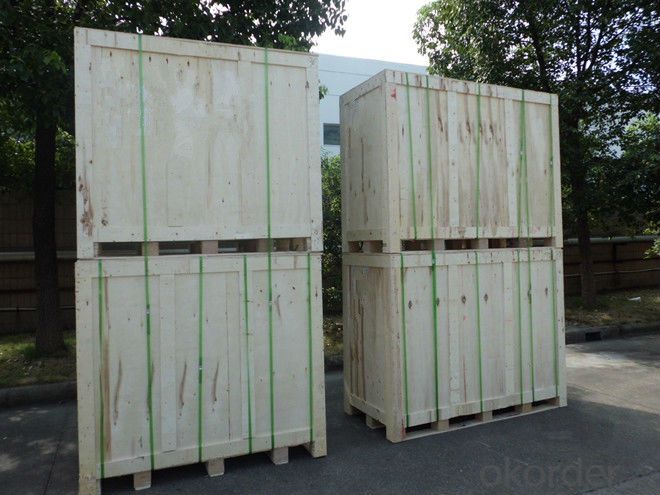
Cheap Solar Panel Module 250w
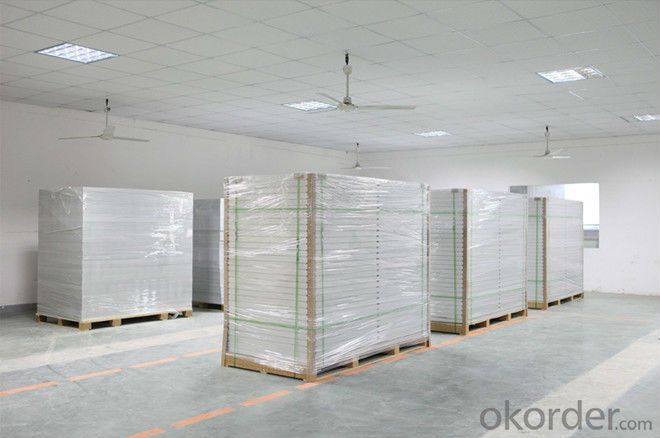
FAQ
I. Will you focus on the safety of the goods during transportation?
Yes, Safety of the cargo is the primary element that we would consider on transportation.
II..How would guarantee the quality will meet the requirements of your clients?
Before shipment, we will have inspection for each batch of goods.
III..What certificates do you have?
IEC,UL,TUV,CSA,etc.
IV..Can you do OEM according to clients’ requirements?
Yes, we have our own brand while we can provide OEM service.
- Q: How do solar panels affect the overall resilience of a building?
- Solar panels can greatly enhance the overall resilience of a building by providing a reliable and sustainable source of electricity. By generating clean energy from the sun, solar panels reduce dependency on traditional power grids, making the building less susceptible to power outages and fluctuations. Additionally, solar panels can continue to operate during extreme weather events, ensuring a constant power supply. This increased energy independence and stability make the building more resilient and better equipped to withstand challenges and disruptions.
- Q: Hello, I have been trying to go green, I Have purchase somesolar panel they are about 45watts I been putting it against my window and getting ok power out of it enough for my lights and a couple of low watts gadget (cellphone, 2v light, portable dvd) for couple of hours.But its seem to drain the 2v faster then I can charge Am I getting the most power out of my panel?Or should I place it on the roof? I'm in Texas and it gets hot and sunny the sun beam my room windows pretty good during 4pm-6pm.
- The MOST efficient placement is on a motorized mounting that constantly moves it to face the Sun directly. Almost nobody does that because it is clumsy and expensive. The best fixed position is facing X degrees due south of straight up, where X is your latitude. I am in Austin, at about 30 degrees latitude, so on the south side of a 30 degree pitched roof would be ideal. The direct south facing it the best average to catch morning and afternoon sun, with most efficient pointing at noon. The tilt equal to latitude is the best average between the high Sun in summer and low Sun in winter, with most efficient pointing in spring and fall.
- Q: Online stores selling solar photo-voltaic generation kits gives specs indicating the power generation capability of the system. For example, Solar World Grid-Tie Solar Electric System with 245W Panels PV Powered PVP2000 Inverter, .2 to 2.4 kW. This seems to indicate that the system can generate .2 to 2.4 kW. Is that per day? Per month? I'm trying to calculate the return on investment, but can't because I don't know how much power a system such as this will generate in a month.
- As Ed said, that .2 kW is an instantaneous rating in bright sun. The way to do this right is to consult the maps here rredc.nrel /solar/old_data/nsr... to find the number of equivalent sun-hours your location gets per day. Select, Average, Annual, Flat plate tilted south at latitude. A map will come up. For northern California, it shows 5 equivalent sun hours per day, for example. If the system is .2 kW, then .2 x 5 = 6.0 kWh of energy the system will generate per day, on average. That takes into account cloudy days, short winter days, long summer days, everything. The 2.4 kW system would give double that, obviously. But that's an example, based on a specific location. Phoenix would do better, Seattle would do worse.
- Q: How much candle lights is required to operate a 205 watt solar panel?
- The intensity of direct sun is about 0,000 foot-candles. It would not be practical to light that many standard candles and put them foot away from the panel, but you could supply that intensity with electric lighting. That's in fact how they establish the power ratings of a given panel; they have a rig that provides a standard test condition of sun.
- Q: Can solar panels be installed on forests or protected areas?
- Solar panels can be installed in forests or protected areas, but it should be done with careful consideration and planning to minimize the potential negative impacts on the ecosystem.
- Q: Can it be used on a cellphone so u never have to worry about low battery?
- they are a long way from producing enough electricity to keep a cell phone charged. but maybe some day in the future. but as our culture is recognizing the importance of solar electricity they are starting to mass produce solar panels and creating major problems of wast when they get old and stop producing electricity. they are super toxic and shouldnt be thrown away. they will prob have special places set of for those in the future.
- Q: I made three 36 solar cell (3x6 .5V 3.5A) panel and had it hooked a up to an old car inverter. I was on line looking for a cheap grid tied inverter. I came across the Enphase micro inverter and was wondering if i could use one of those. Will it work?
- I okorder /.. 2) A Gel Cel or automotive battery to hold the solar power. Once you have those parts connected, you can run an extension cord to your security lights to power them at night with the solar power you have collected during the day. Later, you can expand your solar array and power numerous appliances like a refrigerator in your garage or even a freezer. I have been using solar power for several months now and deeply enjoy the ability to create renewable energy. I wish you luck with your efforts as well!
- Q: I am thinking of buying a 3w solar panel called the nomad 3 from goal zero. I want to charge 35Wh lithum batteries. I have heard that lithium batteries are temperatmental and without a regulated current things could get ugly.I have a couple of chargers that came with the batteries. One is a 2v car charger and another is 0-240v wall charger.Goal zero sell something called a sherpa 50, which contains rechargeable batteries and an inverster and I think they suggest that I charge my batteries indirectly through the Sherpa 50, however, the sherpa 50 is expensive at $200, and seems to have a small capacity, in addition to being extra weight that i don`t want to carry.Electronics geniuses, you are my only hope.
- Lithium batteries do have special charging requirements. I would recommend that you use the 2 volt charger that came with them to keep them happy. Automotive power systems can have voltages as high as 4.5 volts when the engine is running so there's no need to limit the output of the panel to anything less than that. Check with the charger manufacturer to see what it will withstand. Some will work with systems up to 24 volts nominal (up to 29 volts actual) found in larger commercial vehicles such as trucks and busses. If your charger will work with both 2 and 24 volt systems you might not need anything extra to use the unregulated output of the panel. Otherwise I'd recommend a shunt regulator to clamp the output of the panel to no more than 4.5 volts. That way it would dissipate (waste) very little of the panel's power, and even that would only be during those rare times when the panel is producing maximum output. Such a device could be as simple as a high power zener diode, a low power zener coupled with a power transistor, or a precision shunt regulator such as a TL43 coupled with a power transistor. A more complex way would be a to use buck/boost regulator between the panel and your charger. You might gain a slight advantage under low light conditions when the panel isn't putting out much but the overall efficiency could end up worse than the simpler shunt regulator. Under optimum conditions, I would expect it to take a full day for a 3 watt (peak) panel to charge just one of your 35 Wh batteries. Charging an intermediate device such as the Sherpa 50 through its built in charger and then using it to charge your battery through yet another charger would severely cut your overall efficiency. Depending on how long you'll be gone, it might be far more practical, reliable, and economical to just carry (or find a way to be resupplied with) a few additional fully charged 35 Wh batteries. Don
- Q: I live in Hawaii and having a solar panel is not a bad idea since we have plenty of sun the only problem is that it cost a lot of money and takes many years before you get your money back. There are kits available where you can make and install your own solar panel and wind turbine but is it bull **** or is it a good deal?
- If you're in Hawaii, number one, be sure to get a solar water heater. Guaranteed fast payback. Now about those kits. Avoid the kind that says you can make your own panels for under $200. Those are scams. If you're in CC of Honolulu, you will not be allowed to connect that kind of panel to your house - it doesn't meet National Electrical Code because it doesn't have a safety rating like UL. There are kits for grid-tied solar that run from $6000 on up. That's the kind that can actually save you money. I don't know whether you are allowed to install it yourself, though. In California, you can, as long as you get the inspection, same as any other building project. In spite of being further south, Honolulu gets about the same amount of sun as we do in San Jose, California. That's because our area is dry, and you have more clouds and rain during an average year. If you're in one of the wet valleys like Manoa or Palolo, obviously the situation would only be worse. But your electric rates are high, so you have a good chance of making your money back. Very few sites are really good for wind turbines. You cannot just put it on your roof in the city - it needs to up high, where the wind is strong and steady. That's why you see turbine mounted on towers. Also, because it has moving parts, it's going to wear out. Finally, you know how cars rust out quickly there compared to the mainland? Same thing with a wind turbine.
- Q: Can solar panels be used in areas with high levels of air humidity or moisture?
- Yes, solar panels can be used in areas with high levels of air humidity or moisture. While excessive moisture may slightly reduce the efficiency of solar panels, modern panels are designed to withstand a variety of weather conditions, including high humidity. Furthermore, regular maintenance and cleaning can help mitigate any potential impacts on performance.
Send your message to us
Manchester Solar Panels - Outdoor Mono 260W PV Solar Module with Certification TUV
- Loading Port:
- Ningbo
- Payment Terms:
- TT or LC
- Min Order Qty:
- -
- Supply Capability:
- 600MW watt/month
OKorder Service Pledge
OKorder Financial Service
Similar products
Hot products
Hot Searches
Related keywords
